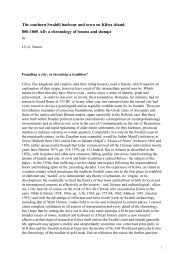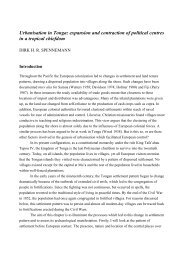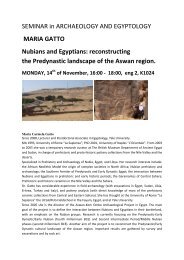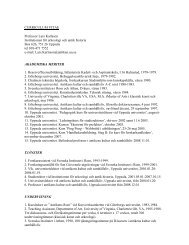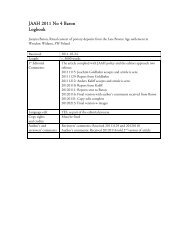Beowulf - Institutionen för arkeologi och antik historia
Beowulf - Institutionen för arkeologi och antik historia
Beowulf - Institutionen för arkeologi och antik historia
Create successful ePaper yourself
Turn your PDF publications into a flip-book with our unique Google optimized e-Paper software.
himself back to the present and the praising that must be performed between lines 56<br />
and 77, he first wonders about his worthiness (ll. 57–62), and then tells Lupus how<br />
others, i.e., the Roman, the Greek, the German and the Briton, shall flatter him with<br />
their instruments and songs (ll. 63–71).<br />
In the last line, however, Venantius bestows upon Lupus the most private, but in<br />
its cringing simplicity also the highest esteem when he says:<br />
ast ego te dulcem semper habebo, Lupe.<br />
(Venantius Book VII, poem 8, l. 79)<br />
but I shall always love you, Lupus.<br />
The poem refers mainly to two events. The first is Venantius’ arrival at Metz, the<br />
other Lupus’ safe return to the same place. The latter event has just happened and it<br />
is the reason for composing the poem. We know that Venantius arrived in spring 566<br />
AD and we are told in the poem that that was the time when Lupus was giving advice<br />
to the fatherland. Judging from the feverish feelings towards Lupus which possess<br />
Venantius, when he reminds himself of the situation, and the anxiety he feels when<br />
Lupus is away, and nobody has any information about him, we must suppose that his<br />
love for Lupus is still fresh. The much calmer tone of the third and fourth poems, nine<br />
years later, supports this interpretation.<br />
What Lupus is returning from, or in the language of the love-sick Venantius, what<br />
he has been ‘saved from’, is almost certainly the campaign against the Dano-Saxon<br />
army. To a Germanic hero war is of course nothing you are saved from unless everything<br />
he has uttered in the hall before he went out to the campaign was but empty<br />
words and he himself is not a hero. However, to the peaceful and sentimental<br />
Venantius the horrors of war must, if we survive, obviously be something from which<br />
we have been saved. Even the widespread praise and songs that Venantius foresees<br />
indicate that it is indeed Lupus’ martial skill and victories that are going to be praised<br />
by everybody and Venantius’ first poem to Lupus is precisely that kind of verse and<br />
the only ones that he could refer to when in line 69 he says that ‘I give you verses,<br />
may the barbaric song give you lays, so shall in different ways the same praise be<br />
bestowed on the man’. This reference cannot be to the poem we are reading at the<br />
moment, since it is not what we would expect, e.g., of a German scop singing about<br />
Lupus. Venantius’ first poem to Lupus is, however, the equivalent of the scop’s lay.<br />
The two first poems to Lupus are in other words two ways of viewing the same<br />
matter.<br />
Venantius’ first poem to Lupus, the official one, is indeed an example in Latin of<br />
what, according to the second poem, is happening just now, also in the Celtic and<br />
Germanic languages. In his second poem Venantius shows himself to be even more<br />
flattering than others when he points out that to him Lupus is still the father (or beloved)<br />
rather than the official hero. Of course, this fact does not prevent Venantius,<br />
as Sigibert’s scop, from praising Lupus officially. That is his craft and it enables him in<br />
111



